Suchergebnisse
IEA SHC Task 64: Artikel in der Zeitschrift „nachhaltige technologien“ Ausgabe 02-2022: Solare Prozesswärme – Kriterien für den Vergleich erneuerbarer Technologien

Die exergetisch sinnvolle Dekarbonisierung des industriellen Energiesystems kann nur gelingen, wenn alle verfügbaren Quellen genutzt und, wo sinnvoll, kombiniert werden. Genau damit beschäftigt sich ein gemeinsames Projekt des „Solar Heating and Cooling Programme“ und des „Solar Power and Chemical Energy Systems (SolarPACES)“ Technologieprogramms der Internationalen Energieagentur (IEA SHC Task 64 / SolarPACES Task IV) und speziell ein Teilprojekt (Subtask E) unter der Leitung von AEE INTEC.
Herausgeber: AEE - Dachverband, nachhaltige technologien 02-2022, Seite 27
Deutsch, 3 Seiten
IEA Bioenergy Task 40: Intertaskprojektbericht "Erneuerbare Gase, Einsatz, Märkte und nachhaltiger Handel" (2022)

Das Projekt zielt darauf ab, Entscheidungsträger:innen und der Forschungsgemeinschaft einen umfassenden Überblick über den aktuellen Wissensstand zu erneuerbaren Gasen zu geben, der sowohl die Technologieentwicklung, Infrastruktur und geeigneten Mechanismen inkludiert, um die Rolle der erneuerbaren Gase in globalen Klimaszenarien für eine Welt, die deutlich unter 2°C liegt, besser einzuschätzen.
Fritsche U., Gress H.W., Hennig C., Liebetrau J., Monaghan R., Majer S., Olson O.
Herausgeber: IEA Bioenergy Task40, 2022
Englisch, 30 Seiten
Downloads zur Publikation
IEA DHC Annex TS3: Paper - A collection of SWOT factors (strength, weaknesses, opportunities and threats) for hybrid energy networks (2021)

In diesem Paper werden die Stärken, Schwächen, Chancen und Risiken (SWOT-Analyse) von hybriden Energiesystemen analysiert.
Ralf-Roman Schmidt, Benedikt Leitner
Herausgeber: Energy Reports, Volume 7, Supplement 4, 2021
Englisch, 6 Seiten
Technologiereport: Digitalisierung der Bau- und Immobilienbranche
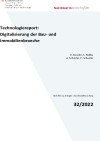
In der Vielzahl digitaler Möglichkeiten ist es nur sehr schwer möglich, einen Überblick zu behalten, Trends und Potentiale abzuschätzen sowie Zusammenhänge zu erkennen. Der vorliegende Report zielt daher darauf ab, den aktuellen Stand der Technik und die Markteinschätzung vielversprechender digitaler Technologien zu beschreiben. Es werden Informationen über konkrete Anwendungsfälle, Mehrwert und Herausforderungen der jeweiligen Technologien bereitgestellt. Die dargestellten Analysen dienen der Potentialbewertung und der strategischen Weichenstellung zur Integration der aktuell wichtigsten digitalen Technologien der Bau- und Immobilienbranche.
Schriftenreihe
32/2022
K. Künzler, S. Robbi, A. Schuster, P. Schuster
Herausgeber: BMK
Deutsch, 92 Seiten
Downloads zur Publikation
IEA Bioenergy Task 37: Report "Green methanol from biogas in Denmark a versatile transport fuel" (2020)

Der Report gibt eine Übersicht über die Herstellung von Grünem Methanol aus Biogas in Dänemark und dem Einsatz als vielseitiger Kraftstoff.
Kim Winther, Peter M. Mortensen, Jørgen Kamp
Herausgeber: IEA Bioenergy Task 37, 2020
Englisch, 4 Seiten
Downloads zur Publikation
IEA Bioenergy Webinar – Integrated Biogas Systems – Sustainable Solutions Beyond Energy (2022)

IEA Bioenergy Task 37 organisierte im Dezember 2022 ein Webinar über Biogassysteme, ihre Integration in komplexe Energiesysteme und die damit verbundenen sektorübergreifenden Vorteile.
Herausgeber: IEA Bioenergy TCP, 2022
Englisch
IEA Bioenergy Task 42: Country Report Australia - Mai 2021

Der australische Länderbericht gibt einen länderspezifischen Überblick über die gesamte Primärenergieversorgung Australiens und den Beitrag der Bioenergie dazu.
Geoffrey Bell
Herausgeber: IEA Bioenergy Task 42, 2021
Englisch, 29 Seiten
IEA PVPS Task 12: Factsheet - Environmental life cycle assessment of electricity from PV systems (2021)

Kurzzusammenfassung der Ergebnisse der LCAs
Rolf Frischknet, L. Krebs
Herausgeber: IEA PVPS, 2021
Englisch, 4 Seiten
Downloads zur Publikation
IEA GHG: Defining the Value of Carbon Capture, Utilisation and Storage for a Low Carbon Future (TR 2022-09)

Multi-disziplinäre Studie über die zukünftige Bedeutung von CCUS als Klimaschutztechnologie.
Chris Greig, Sam Ude, Oscar Vosshage
Herausgeber: Andlinger Center for Energy and the Environment, Princeton University, New Jersey, USA im Auftrag des IEA Greenhouse Gas R&D, 2022
Englisch, 72 Seiten
Summer University Vienna: Green.Building.Solutions.
26. July - 17. August 2014
Wien, AT
First hand ecological knowledge and engineering expertise bundled in a three-week program in the capital of energy efficient building: Vienna. Think sustainable, take care of your future - now.
Second Semi‐annual Bioenergy Task 33 Meeting, 2015 – Meeting Minutes
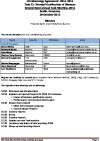
Meeting Minutes sind eine Zusammenfassung der Ergebnisse des Bioenergy Task 33 Meetings in Berlin im Oktober 2015.
Jitka Hrbek
Herausgeber: IEA Bioenergie Task 33
Englisch, 23 Seiten
Downloads zur Publikation
Workshop Report "Aviation Biofuels through Biomass Gasification" (2016)
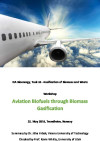
Der Bericht zum Thema „Biobrennstoffe für den Luftverkehr“ ist eine Zusammenfassung der Ergebnisse des Workshops.
Jitka Hrbek
Herausgeber: IEA Bioenergie Task 33
Englisch, 36 Seiten
Downloads zur Publikation
IEA SHC Task 65: Paper "Solar Cooling for the Sunbelt Regions – a new IEA SHC Task" (2020)

Dieses Paper stellt den IEA SHC Task 65 und seine wichtigsten Inhalte vor, hebt die laufenden Forschungsprojekte hervor und soll ein größeres Publikum für die Teilnahme an der Initiative gewinnen.
Daniel Neyer, Uli Jakob
Herausgeber: International Solar Energy Society, EUROSUN 2020, Proceedings, 202
Englisch, 8 Seiten
Downloads zur Publikation
Energy Audits for Motor Driven Systems, Part 1: Overview of Programmes, Tools, Guides and Analysis for Standards and Protocols for Motor Systems Audits, Working Document
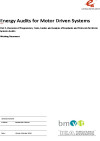
Dieses Arbeitsdokument stellt Auditprogramme und Qualifikationsanforderungen an Auditoren in den teilnehmenden Ländern dar und analysiert relevante Normen zu Energieaudits und zum Nachweis von Energieeinsparungen.
Konstantin Kulterer
Herausgeber: Österreichische Energieagentur
Englisch, 64 Seiten
Downloads zur Publikation
Abschließender Besuch der „Haus der Zukunft“-Leitprojekte
9. Österreichisches Wirbelschichttreffen
26. - 28. April 2017
Rogner Bad Blumau, 8283 Bad Blumau, AT
Plattform zum Informationsaustausch zwischen den BetreiberInnen von Wirbelschichtanlagen in Österreich und weiteren Stakeholdern der Wirbelschichttechnik. Ergänzend dazu erfolgen thematisch passende Vorträge aus den Bereichen Forschung und Anlagenbau.
Climate Sensitive Photovoltaics
23. May 2017
Falkensteiner Hotel Asia Spa Leoben, Leoben, AT
Der Workshop fokussiert auf die Leistungsfähigkeit und Zuverlässigkeit von Photovoltaik Systemen in unterschiedlichen Klimazonen sowie auf Überprüfung der Komponenten auf klimabedingte Stressfaktoren.
IEA Windenergie Task 27: Einsatz von Kleinwindkraftanlagen in Gebieten mit turbulenten Strömungsbedingungen
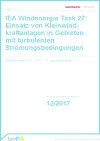
Schriftenreihe
12/2017
K. Leonhartsberger
Herausgeber: BMVIT
Deutsch, 39 Seiten
Downloads zur Publikation
The new fuel Chain: From renewables to cells (2016)

Die Studie gibt einen Überblick über die Herstellung verschiedener Brennstoffe (gasförmig und flüssig) aus erneuerbarer Energie bzw. Energieträgern, vorwiegend Biomasse, welche dann für die Wärme- und Energieerzeugung in Brennstoffzellen genutzt werden können. Die verschiedenen Konzepte dieser neuen „Fuel Chain“ werden in diesem Bericht sehr anschaulich dargelegt.
Stephen J. McPhail, Viviana Cigolotti, Lorenzo Abate, Emanuele Belella und Angelo Moreno
Herausgeber: IEA Advanced Fuel Cells TCP– Annex 33 – Stationary Applications
Englisch, 44 Seiten
Downloads zur Publikation
IEA AFC Annex 31: Air Starvation Accelerated Stress Tests in Polymer Electrolyte Fuel Cells (2016)

Der Effekt periodisch auftretender Sauerstoffunterversorgung auf die Polymerelektrolytbrennstoffzelle wurde untersucht.
Merit Bodner, Alexander Schenk, Bernhard Marius, Mija Rami und Viktor Hacker
Herausgeber: ECS Trans. 75 (14), 769-776
Englisch, 8 Seiten
